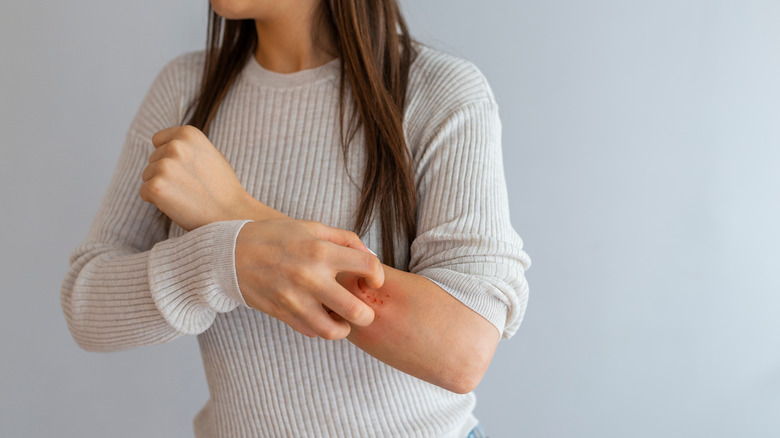Why Stress Makes You Break Out In Hives
It seems there's no escaping stress these days. While you're probably familiar with the common side effects of stress, such as nervousness, anxiety, and trouble sleeping, you might not be aware that stress can also cause problems with your skin (via Cleveland Clinic). In fact, stress can actually lead you to break out in hives, or red welts that swell on the surface of the skin. Hives vary in size from small to large and can occur anywhere on the body. Unfortunately, in addition to being unsightly, they can cause itching, burning, and pain, as well.
Hives are usually brought on by an allergic reaction to certain foods, fabrics, or chemicals. But emotional stress can also trigger an outbreak of hives. In response to stress, a number of hormonal and chemical changes occur in the body (via Medical News Today). These changes can cause blood vessels to expand and leak, resulting in hives. Stress may also worsen existing skin conditions like psoriasis and eczema and prevent them from healing properly.
How to treat hives
If your skin has broken out in hives, the first thing to do is try to relax. "Avoiding stress is the first recommended treatment — but, of course, that's hard to do," Dr. Brian Myers, a family medicine physician, says in a post on the Cleveland Clinic's website. "And unfortunately, the itchiness, pain and appearance of hives can increase stress levels even more." Try to figure out the cause of your outbreak by thinking of any new foods or products you've tried recently to rule out exposures.
To help relieve symptoms, you can try taking an over-the-counter antihistamine. However, skip taking aspirin and non-steroidal anti-inflammatory (NSAID) medication, as these can actually trigger hives. Wear loose-fitting clothes, use mild soap, and avoid hot water on the affected areas. Hives are typically not an emergency and usually clear up on their own. If hives last longer for a few days, see your doctor. A physician can help you figure out the cause and advise on any further treatment.


